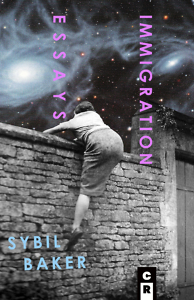Travel can be a luxury, a diversion, an obsession, a necessity, or a means of survival. In Sybil Baker’s Immigration Essays, it’s all those things, as well as a kind of existential meditation—movement as a way of being in the world. In the thirteen pieces that make up this slim collection, Baker places accounts of her own relatively privileged experience of travel alongside stories of less comfortable wanderers, including international refugees.
 Baker, an associate professor of English at the University of Tennessee in Chattanooga, received a MakeWork grant to write about the city’s “unheard voices,” and the stories here are as varied and poignant as you might expect. “Landings” chronicles the journeys of Dmitri, a Ukrainian who was persecuted and marginalized in his home country because of his Pentecostal faith; and Rolando, a human-rights activist from Cuba whose struggle to reach the U.S. lasted ten years. One of the most compelling stories concerns Abril, a Mexican immigrant whose life was profoundly altered by DACA (or Deferred Action for Childhood Arrivals), an Obama policy that allows undocumented individuals who entered the U.S. as minors to avoid deportation.
Baker, an associate professor of English at the University of Tennessee in Chattanooga, received a MakeWork grant to write about the city’s “unheard voices,” and the stories here are as varied and poignant as you might expect. “Landings” chronicles the journeys of Dmitri, a Ukrainian who was persecuted and marginalized in his home country because of his Pentecostal faith; and Rolando, a human-rights activist from Cuba whose struggle to reach the U.S. lasted ten years. One of the most compelling stories concerns Abril, a Mexican immigrant whose life was profoundly altered by DACA (or Deferred Action for Childhood Arrivals), an Obama policy that allows undocumented individuals who entered the U.S. as minors to avoid deportation.
Most of the travel in Immigration Essays, however, is Baker’s own. A child of the South who spent much of her youth in Fairfax, Virginia, Baker has given a sizable portion of her adult years to far-flung places. Like many another sensitive soul, she found the suburbs of her childhood “stifling, alienating, and oppressive” and sought an antidote in alien landscapes. Along with her husband, she spent twelve years in South Korea, an experience she writes about in “Wanderings.” Although she’s frank about her struggle to adjust to the foreign culture and diminished material comforts, she lauds the experience as life-changing: “What living abroad did for me allowed me to live as an outsider and to see the world, forever, in broader terms. It saved me from despair.”
 It’s useful, and perhaps inevitable, for any discourse about travel to consider the problem of home—its allure, as well as its frustrations, inadequacies, and troublesome ghosts. Baker spends a lot of time in these essays exploring her own complicated efforts to find or create a home. “Schemers” recounts her defeats and victories in the Chattanooga real-estate market. It’s a struggle she describes with real earnestness and emotion, yet with a certain detachment, too.
It’s useful, and perhaps inevitable, for any discourse about travel to consider the problem of home—its allure, as well as its frustrations, inadequacies, and troublesome ghosts. Baker spends a lot of time in these essays exploring her own complicated efforts to find or create a home. “Schemers” recounts her defeats and victories in the Chattanooga real-estate market. It’s a struggle she describes with real earnestness and emotion, yet with a certain detachment, too.
As Baker recounts some of her adopted town’s ugly past in “Brief Histories”—a 1906 lynching on the Walnut Street Bridge, the city’s role as the starting point of the Trail of Tears—she sounds more like a sensitive, fascinated traveler than a mournful, quietly conflicted white resident. When she writes of “dwelling in the house of the forgiven,” she seems to be speaking, as a true global citizen would, of terrible wrongs and reparations due everywhere, and not just in her back yard.

Maria Browning is a fifth-generation Tennessean who grew up in Erin and Nashville. A graduate of Mount Holyoke College, she has attended the Clothesline School of Writing in Chicago, the Moss Workshop with Richard Bausch at the University of Memphis, and the Sewanee Writers’ Conference. She lives in White Bluff.
Tagged: 2017 Southern Festival of Books, Nonfiction, Sybil Baker





